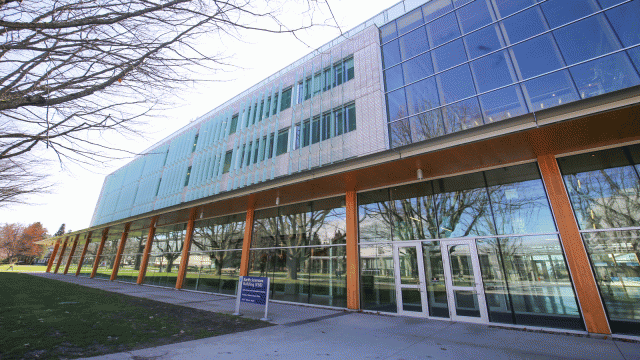Environmental Sciences concentrates on understanding the major environmental issues facing human societies and it adopts an integrative cross-disciplinary approach to the study of these issues. This program provides a significant background in physical sciences, earth and ocean sciences, and life sciences.
Why this program?
- Study at one of the world’s top-ranked universities in earth environmental sciences.
- Take classes and labs in UBC’s new Earth Sciences Building.
- Tailor the specialization to your interests with concentrations in land, air and water, or ecology and conservation.
Program information
Send details- Campus: Vancouver
- Faculty: Faculty of Science
- Degree: Bachelor of Science
- Length 4 yrs
- Co-op Yes
- Honours Yes
Environmental Sciences is the application of scientific knowledge from many disciplines to issues relating to the sustainability of resource use, the increase in human population, the degradation of the environment caused by pollution and disturbance, the endangerment and extinction of species and natural systems.
The specialization is interdisciplinary and is designed to give students a strong foundational science background. It concentrates on understanding the major environmental issues facing human societies and adopts an integrative cross-disciplinary approach to the study of these issues. Students supplement course classes with electives in a broad range of earth and ocean sciences fields depending on their area of concentration.
Experiential learning and research
Seminars and student projects are designed to help you perfect your communication skills and ability to work in groups, preparing you for future employment and teamwork as an environmental scientist. All environmental science students are required to do a major project (two terms) in their final year. Majors students engage in a team project in collaboration with a community partner organization, while honours students undertake an individual research project with a faculty supervisor.
Campus features
The Department of Earth, Ocean, and Atmospheric Sciences is home to the Environmental Interfaces Laboratory (EIL) and the Pacific Museum of the Earth. The Beaty Biodiversity Museum is also open to students.
Send detailsLife at UBC's Vancouver campus
Built in 2012 to LEED Gold construction standards, the Earth Sciences building is home to the Department of Earth, Ocean, and Atmospheric Sciences. It houses the department’s cluster computers for numerical weather and climate simulations, weather-instrument platform for research and teaching, modern labs for oceanographic research, wet labs, and two computer lab classrooms for undergraduate student use.
Find out moreYour future
A BSc in Environmental Sciences can lead to careers in research, government, industry, law, medicine, occupational health, education, or advocacy.
The Environmental Sciences specialization provides grounding in a broad field of scientific disciplines and a solid background in understanding environmental challenges. You’ll graduate with strong critical thinking, communication, and research skills, plus the ability to work effectively in teams. These skills are highly sought after and are transferable to many workplaces.
Program graduates
- Science and policy associate, Environmental Law and Policy Center
- GIS technician, Environment Canada
- Environmental technician, Cascade Environmental Resource Group Ltd.
- Graduate student in Environmental Sciences, Hong Kong University of Science & Technology
- Laboratory assistant, ALS Environmental
- Junior forestry technician, Integrated ProAction Corp.
Program requirements
English-language requirements
English is the language of instruction at UBC. All prospective students must demonstrate English-language competency prior to admission. There are numerous ways to meet the English Language Admission Standard.
General admission requirements
IB Diploma Programme
- Completed IB Diploma, including at least three Higher Level courses.
IB Certificate Courses
- IB Certificate courses (Standard and Higher Level) may be used in an admissions average if you are graduating from a recognized high school curriculum that can be used as your basis of admission.
- IB Math Applications and Interpretations SL, or IB Math Studies, do not satisfy the math requirement for admission to UBC’s science-based programs, the Faculty of Management, the UBC Sauder School of Business, or the Vancouver School of Economics.
Degree-specific requirements: Science
- IB Math Analysis and Approaches SL or HL, or IB Math Applications and Interpretations HL (IB Math Applications and Interpretations SL, or IB Math Studies, are not acceptable)
- One of IB Biology, IB Chemistry, or IB Physics
- Grade 11 or equivalent Chemistry, and
- Grade 11 or equivalent Physics (may be waived with grades of 5 in IB Chemistry and in your IB Mathematics course)
Note: Grade 11 Chemistry and Physics requirements listed are only relevant to students who are not completing the equivalent IB Diploma Chemistry and/or Physics courses.
For students studying outside of Canada, some examples of courses that may be accepted as Grade 11 equivalents are junior-level courses for American students, and IGCSE and O Level for those following British-patterned curricula.
Related courses
The following subject categories are particularly relevant for this degree. Consider taking courses in these areas in your junior year and senior year.
- Language Arts
- Mathematics and Computation
- Sciences
